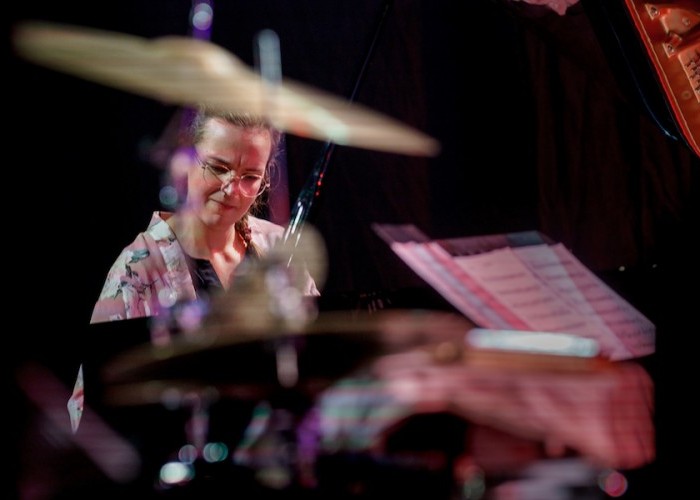Jan 13, 2026 2:09 PM
More Trump-Kennedy Center Cancellations
The fallout from the renaming of the John F. Kennedy Center for the Performing Arts to include President Donald…

Kirke Kardja performs as a member of the Karja-Renard-Wandinger Trio at EJN.
(Photo: Courtesy European Jazz Network)Perhaps no musical tradition is more invested in direct interaction and spontaneous give-and-take than jazz, practices seriously impeded by the still crushing pandemic that has shut down much of the world since March of 2020. Of course, the COVID-19 crisis has altered many other facets of life as we know it, including the business of jazz music. The European Jazz Network, which was formed in 1987 to help presenters and festival organizers synchronize and cooperate in concert organizing, conducts much of its activity through direct contact. Every September EJN colleagues gather in a city where some members call home. That was halted in September of 2020 when the event planned to take place in Sofia, Bulgaria, was forced online.
Spin ahead to 2021. It was hard to miss the sense of cautious optimism that marked the first EJN conference in two years, when its membership assembled in Tallinn, Estonia, Sept. 16–20, with more than 220 delegates representing 34 nations. This year’s conference theme tweaked the title of Ornette Coleman’s prescient 1959 album The Shape Of Jazz To Come into “Shapes Of Jazz To Come,” considering the challenges live jazz faces as activity finally begins to resume in the touring circuit. Over the course of three days, associates socialized, planned and looked ahead with a series of panel discussions, speeches and performances. Naturally, the difficulties imposed by the pandemic dominated most of the conversations, but surprisingly, the consensus seemed to be that in adapting to dire circumstances often led to productive outcomes.
Robert Abel, head of commercial audio strategy for the British newspaper the Guardian led a spirited analysis on the rise of podcasting, focusing on how the medium could help presenters, labels and musicians attract new audiences through dynamic storytelling. While some feared that a medium frequented by commuters would suffer as employees began working from home, the opposite proved true, as listenership generally skyrocketed. But, perhaps, the most riveting testimony came from two musicians: British pianist/composer Alexander Hawkins and Copenhagen-based Estonian saxophonist/composer Maria Faust, who compared their lockdown experiences in a discussion moderated by Helen Sildna, an Estonian cultural entrepreneur who founded the industry showcase Tallinn Music Week in 2009.
Faust revealed that she used the time off as a vacation, noting that under normal circumstances she never really gets to step away from work. Having the time and space to disconnect was a gift for her, she said. On the flipside, she struggled with the increasing prevalence of right-wing politics around the globe. When asked if she felt weighed down by the instability imposed by the lockdown, Faust nonchalantly responded that for an improvising musician instability was simply a fact of life, a condition present in all situations. Hawkins also welcomed the free time, spending his many hours immersed in practicing, considering it a valuable opportunity to work on things that are routinely wedged into a very limited number of hours.
The musicians had diverging responses on other topics. Hawkins expressed sympathy for young musicians who lost crucial momentum over an 18-month period that may have represented a significant fraction of a burgeoning career, while Faust felt the lockdown was more trying for established, older musicians who might have felt the pinch on performance opportunities more profoundly. She was also critical of the shift toward online activity, while Hawkins celebrated its potential for creating new avenues of expression, whether through telematic improvisation or newly charted endeavors, praising Craig Taborn’s experimental 60xsixty platform, which had just launched a few days earlier. Both musicians agreed that the lockdown underlined the importance of something lost during this time — gathering in person.
Since the gorgeous city of Tallinn hosted the conference, the live showcases focused on Estonian musicians, many of whom featured adaptations of the country’s vibrant runic song tradition. But the most convincing set this writer experienced was the second-ever performance by a young trio featuring Estonian pianist Kirke Karja, French bassist Etienne Renard and German drummer Ludwig Wandinger, which refracted swing impulses through jagged stop-start rhythms, suggesting a hybrid of the Bad Plus and Punkt.Vrt.Plastik, while tapping some 20th century modern classical influences, including one especially effective piece built upon a Ligeti etude. The sole non-Estonian performance came from the young Swiss group Trio Heinz Herbert, winners of the EJN Zenith Award for emerging artists. The ensemble’s electronics-driven set was inspired by ’70s fusion and electronica, but its meticulously pitched cool was built on adept interplay and timbral variety rather than hollow virtuosity. DB

Belá Fleck during an interview with Fredrika Whitfield on CNN.
Jan 13, 2026 2:09 PM
The fallout from the renaming of the John F. Kennedy Center for the Performing Arts to include President Donald…

Peplowski first came to prominence in legacy swing bands, including the final iteration of the Benny Goodman Orchestra, before beginning a solo career in the late 1980s.
Feb 3, 2026 12:10 AM
Ken Peplowski, a clarinetist and tenor saxophonist who straddled the worlds of traditional and modern jazz, died Feb. 2…

The success of Oregon’s first album, 1971’s Music Of Another Present Era, allowed Towner to establish a solo career.
Jan 19, 2026 5:02 PM
Ralph Towner, a guitarist and composer who blended multiple genres, including jazz — and throughout them all remained…

Rico’s Anti-Microbial Instrument Swab
Jan 19, 2026 2:48 PM
With this year’s NAMM Show right around the corner, we can look forward to plenty of new and innovative instruments…

Richie Beirach was particularly renowned for his approach to chromatic harmony, which he used to improvise reharmonizations of originals and standards.
Jan 27, 2026 11:19 AM
Richie Beirach, a pianist and composer who channeled a knowledge of modern classical music into his jazz practice,…